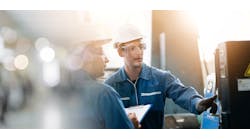I’m nearing retirement and like an increasing number of us, facing it without a pension. We’ve done our best to stash away what we could, but it’s not a fortune and a lot of it is in the stock market—in your companies—so naturally, we keep an eye on the economy and the Dow. We worry when we hear that the treasury bond yield curve has inverted (for three months now), that (as of July 1) this is the longest economic expansion in U.S. history, and that the president continues to threaten tariff increases (and rattle his saber) in ways that cast a shadow on our future.
But here in Northwest Indiana, nothing disturbs me more than a steel mill idling a blast furnace. On June 19, U.S. Steel announced it’s shutting down two blast furnaces in the United States (one in Gary, Indiana and one near Detroit), as well as a third in Europe. ArcelorMittal announced previously that it was idling steel plants in Europe, but product mixes come and go. When you shut down a blast furnace—a source of new steel—due to overcapacity, that’s chilling.
You might figure it’s just due to competition from other suppliers, notably in China, and you might be right. Despite 25% tariffs on most foreign steel, prices of hot-rolled coil—a key metric—have fallen from their peak last year of $900 to less than $600 a short ton. Nine of the world’s 16 largest steelmakers are in China, owned by central and provincial government. Tariffs or not, China knows how to make and sell steel, and no matter where in the world it’s sold, other global suppliers feel the flood.
Cheap labor, cheap energy and cheap raw materials don’t necessarily mean lower-quality steel, but they do tend to indicate higher costs in air pollution, energy efficiency, greenhouse gas emissions and quality of life for the workforce. As U.S. heavy industries struggle to attract competent, young employees, they're increasingly aware of their social profile—their environmental impact and influence on the many other issues of importance to the next generation.
So, what’s a big, hot, stinky, dirty steel industry to do? How about developing a new certification standard that draws a distinction between responsible and irresponsible production? ArcelorMittal, other steelmakers, automakers and industrial associations have been working on “the steel industry’s first, multi-stakeholder certification initiative that aims to set a single, global standard for the entire ‘mine-to-metal’ steel value chain,” says Alan Knight, head of sustainable development, ArcelorMittal, as reported in my local paper, The Times of Northwest Indiana. Look for promulgation later this year.
Certifications of sustainability and responsibility aren’t just for attracting new employees—they’re also important to customers. Hence the involvement of some of steelmakers’ largest clients, the automakers. Car companies care because, as other consumer goods suppliers raise awareness and expectations, their customers care. How can a Lafayette, Indiana-built Subaru mean “love” if making the steel it’s built with exploited workers, filled the air with sulfur, and contributed to global warming?
Of course, pressure to demonstrate and document responsibility isn’t only on steelmakers—it's just remarkable that its reaching back to ingots, melts, blast furnaces and iron ore mines. I’m sure most of you have felt the need to establish and provide proof of similar sustainable practices.
If not, well, you do the math. Many of the young people growing into consumers are noticing their lifespans exceed the coming global warming apocalypse. Their priorities are different from earlier generations.
As for little old retired me, I’d rather see my stocks soar on sustainability than a tariff-laden race to the bottom for air quality and wages. But if saving a little CO2 means I have to cross the Hormel/Alpo line now and then, I can do that. So long as it comes in certifiiably sustainable and recyclable steel cans.





